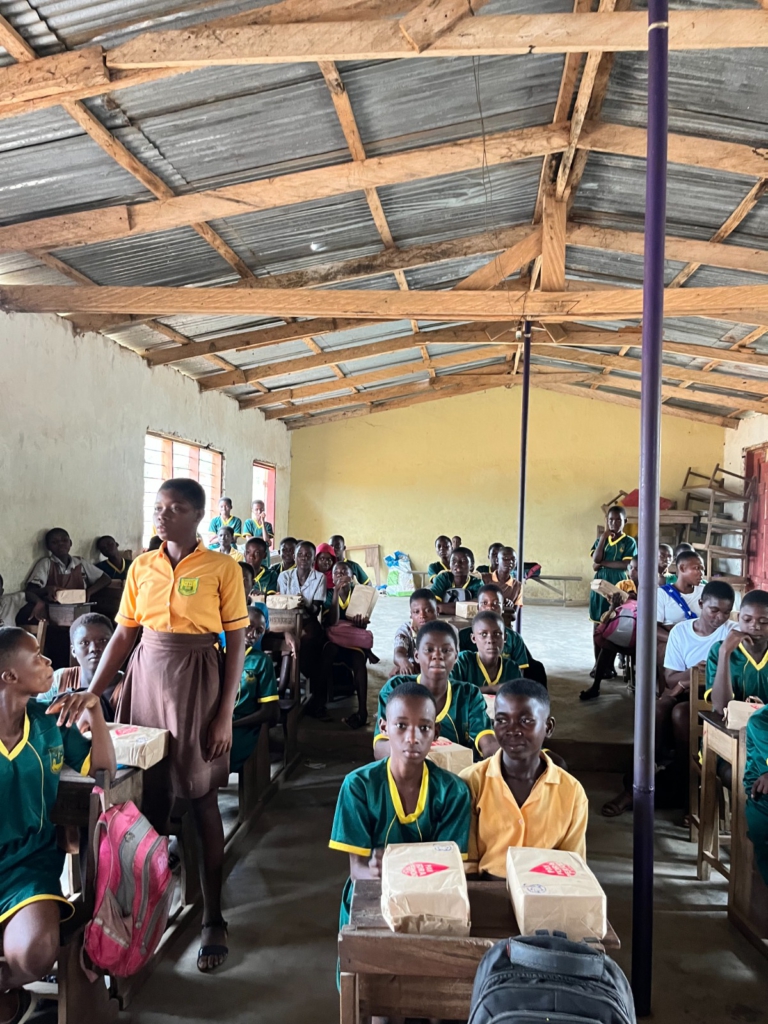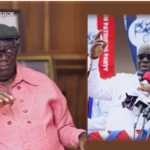The role of menstrual equity is not sufficiently emphasised in discussions on gender equality, women’s empowerment, and development at large. Menstrual equity is ensuring that menstrual hygiene products are safe, affordable, and accessible, in addition to access to the right education and reproductive care.
Given that menstruation is a natural biological function, menstrual hygiene is considered a fundamental aspect of women’s health and well-being and therefore, women’s rights The inadequate access to safe affordable sanitary products and quality menstrual hygiene information has consequences beyond physical and mental health of women and girls in Ghana.
Menstrual inequity perpetuates gender inequalities by limiting opportunities to fully participate in society and access to education. A study reports that 95% of girls in rural areas miss school during their periods due to a lack of sanitary pads, constituting period poverty.
Girls who cannot afford sanitary pads may miss school during their periods, leading to a disruption in their education and widening the gender gap. This affects their long-term prospects and limits their opportunities for personal and economic growth. Women who struggle to afford sanitary products may also face challenges in their work and social participation, hindering their ability to fully participate in society and achieve their potential.
Menstrual inequities also expose girls and women to increased risks of infections and other health complications due to misinformation and ignorance. In some dire cases, menstrual inequity is a breeding ground for sexual violence. This inherently means that the non-achievement of menstrual equity is a risk to the attainment of SDG 5: Gender equality, and consequently to all the other sixteen SDGs in different scales.
Period Poverty: more than just missing school.

Period poverty (absence of menstrual equity) is often limited to the inadequate access to menstrual hygiene products mainly due to high costs. While this may seemingly be the most glaring pain point, it is also important to note that the phenomenon of period poverty entails the lack or inadequacy of access to menstrual hygiene and reproductive education, as well as the inadequacy of or lack of access to hygiene facilities like clean toilets, changing rooms with reliable water supply.
The absence of which will deny women and girls safe and dignified periods. Another worthy contribution to the discourse around period poverty is the need to expand the conversation beyond the parameters of school absenteeism to other equally troubling resultant challenges such as the increased risks of sexual exploitation.
On the issue of expensive menstrual hygiene products, many women and girls are finding it increasingly difficult to afford basic necessities, including sanitary products as costs of living continue to rise in Ghana. This is aggravated among those living in low-income households or marginalized communities.
Women and girls who cannot afford sanitary products may resort to using unhygienic alternatives such as cloth, leaves, or even unsafe materials, risking their health and well-being, risking their health, and increasing their vulnerability to infections and diseases. With money being a major barrier in the first place, who is to say that these infections would be treated the right way and in a timely fashion to forestall dire health challenges in future?
Period poverty also exposes girls and women to increased risks of sexual violence and other forms of abuse. We have heard several reports across media showing this stark reality for many girls and women in Ghana. Girls and women who cannot afford menstrual products may be forced to exchange sex for money or menstrual hygiene products, putting them at risk of sexual abuse and exploitation.
Furthermore, they may be forced by circumstances to engage in transactional sex to acquire menstrual products, which can lead to unwanted pregnancies, sexually transmitted infections, and other physical and mental health complications. In some cases, they stay in relationships where they face frequent abuse just to be able to access basic needs including their menstrual hygiene products. Death as a result of intimate partner violence remains an ever-present risk such women face.
Scrap the tax on menstrual hygiene products!
Menstrual hygiene products in Ghana attract 12.5% VAT and 20% import duty taxes. With rising cost of living and the skyrocketing prices witnessed across all sectors in the last few years, we have seen the cost of menstrual pads move from Ghc7 to as high as Ghc20 in the last quarter of 2022. Not much progress has been made since a proposal by Hon. Adwoa Safo to waive the taxes on menstrual hygiene products. This is telling of the level of government commitment to girl child and women empowerment.
It should not be a luxury to have a safe and dignified period. Menstrual hygiene products are necessities, not items one can choose to live without.
Girls and women deserve to be comfortable when menstruating, considering the various hormonal changes with their attendant physical and mental manifestations. Women and girls should not face financial barriers in managing their menstrual health. It is time the government of Ghana worked with the Ghana Revenue Authority to categorise menstrual hygiene products as zero-rated (essential social goods). #ScraptheTax #DontTaxOurPeriods
Breaking the Cycle: Why Women MPs Hold the Key to Ending Period Poverty in Ghana
Women MPs in Ghana have the power to address period poverty and ensure that menstrual equity is attained to prevent gender inequalities from deepening. They have access to some of the highest pinnacles of power and influence in the country.
By advocating for policies and measures to make sanitary products more affordable, the vision of breaking the cycle of gender inequalities and empowering women and girls in Ghana can gradually be within arm’s reach. This can be achieved through lobbying and working collaboratively with other lawmakers to prioritise menstrual equity in the national agenda, starting with excluding menstrual hygiene products from discriminatory taxes.
In addition to policy advocacy and stakeholder engagement, Ghana’s women MPs can also use their platforms to raise awareness about menstrual health and hygiene, combatting period shame stigma in bridging the gender gap.
By openly discussing the challenges faced by women and girls in accessing affordable sanitary products, they can contribute to creating a society where menstruation is accepted as a fact of life and menstrual hygiene recognised as a fundamental aspect of women’s health and well-being. Honest and informed discussions will build a society that engages in menstruation discourse devoid of shame and misconceptions; one where menstrual equity is seen as a simple matter of human rights and dignity.
Beyond NGOs: Mobilizing Female MPs to Tackle Period Poverty in Ghana.
While many initiatives from NGOs like ‘Pay for a Period’ by the Thriving Women Foundation and other private initiatives have made great strides to tackle period poverty in Ghana, it is simply not enough and quite truthfully will never be enough to eradicate the problem and achieve menstrual equity. This in no way is an attempt to discredit efforts being made by some women MPs to address period poverty and gender disparities in their constituencies.
As work at the legislative level to put menstrual equity on the national agenda starting with scrapping the tax and supporting local production among other measures is ongoing, one approach that female MPs can take is to support and collaborate with existing NGOs and other organizations that are working towards menstrual equity in Ghana. This will allow for more effective implementation of policies and programs leading to maximised impacts and reach. Through such strategic joint efforts, women MPs can ensure that the voices of girls and women in even the remotest parts of Ghana are heard, and their needs are met.
Conclusion
It is crucial to continuously raise awareness about the importance of menstrual hygiene and the impact of unaffordable sanitary products on the health and well-being of women and girls in Ghana, not only on World Menstrual Hygiene Day (May 28th).
Affordable menstrual hygiene products can contribute to improving the health, education, and economic empowerment of women and girls in Ghana. When women and girls have access to affordable and hygienic menstrual products, they can better manage their menstrual health with dignity and without undue financial burden. This can lead to improved health outcomes, including a reduced risk of infections and diseases.
It can also enable girls to stay in school during their periods, ensuring that they do not miss out on their education and have equal opportunities to succeed. Furthermore, when women have access to affordable menstrual products, it can contribute to their economic empowerment by enabling them to participate fully in the workforce without being hindered by their periods or putting them at risk of physical harm.
Menstrual equity is a fundamental human right, and women MPs in Ghana have a crucial role to play in advocating for it. The lack of access to menstrual products not only affects the physical health of women and girls, but also their mental health, education, and economic opportunities.
By pushing for policy changes, raising awareness, and collaborating with relevant organizations, Ghanaian women MPs can help ensure that girls and women in Ghana, regardless of their socio-economic status, have access to menstruation education, menstrual hygiene products and improved water and sanitation facilities in their schools and communities.
It is time for our 40 women MPs to step up and fight together across party lines and ideological differences, for the common good of Ghanaian girls and women. Only then can we truly achieve gender equality and empower women to fully participate in all aspects of society.
–
The author, Edith-Casely Ndidi Fordjoe, is a Communications and Strategy Director
Thriving Women Foundation
www.thrivingwomenfoundation.org
DISCLAIMER: The Views, Comments, Opinions, Contributions and Statements made by Readers and Contributors on this platform do not necessarily represent the views or policies of Homebase Television Ltd.
- President Commissions 36.5 Million Dollars Hospital In The Tain District
- You Will Not Go Free For Killing An Hard Working MP – Akufo-Addo To MP’s Killer
- I Will Lead You To Victory – Ato Forson Assures NDC Supporters
Visit Our Social Media for More




